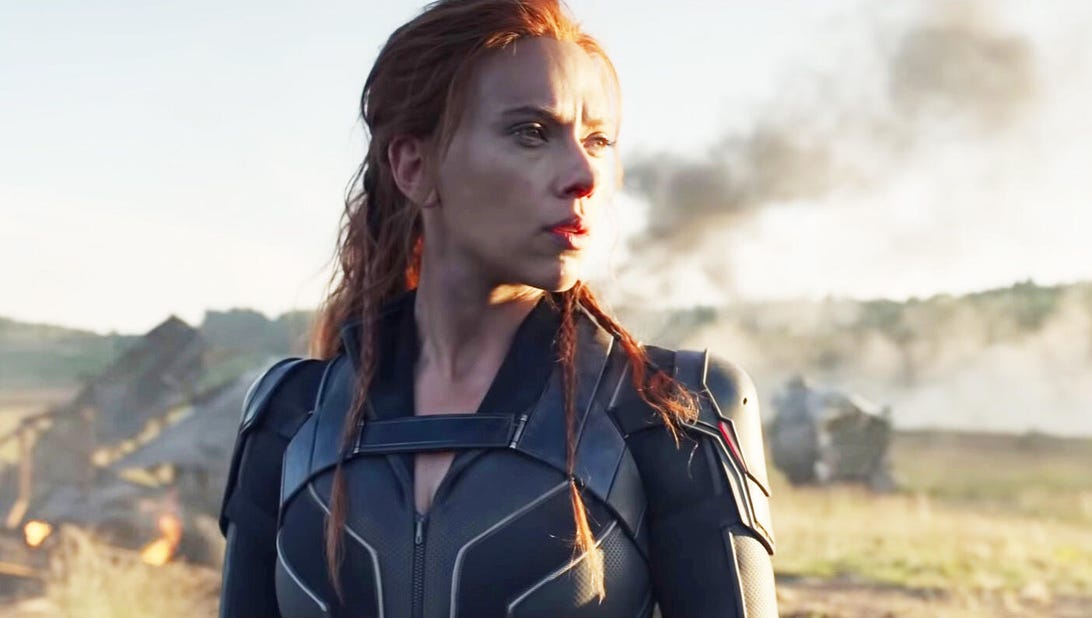
Marvel's Black Widow was delayed multiple times as the pandemic decimated theatergoing.
Marvel Entertainment; screenshot by Joal Ryan/CNETDisney is being sued by Black Widow star Scarlett Johansson over the company's decision to stream the Marvel blockbuster on its streaming service Disney Plus simultaneously with its release in theaters. The suit alleges that Disney breached Johansson's contract and claims she was guaranteed an exclusive theatrical release and missed out on compensation because her pay was partly tied to the the film's box-office performance.
Disney said the complaint had "no merit whatsoever."
"The lawsuit is especially sad and distressing in its callous disregard for the horrific and prolonged global effects of the COVID-19 pandemic," the company said in a statement, adding that Disney "has fully complied" with Johansson's contract. On top of the $20 million Johansson has received to date, Disney said, releasing Black Widow on Disney Plus "significantly enhanced her ability to earn additional compensation."
Black Widow's streaming release is allegedly projected to cost Johansson $50 million in compensation, according to a Wall Street Journal report Thursday, which cited an anonymous person familiar with her contract.
Marvel's Black Widow is the biggest same-day film release on Disney Plus so far. As has become the practice of several major studios during the coronavirus pandemic, Disney released the film in theaters and online at the same time, which gives film fans wider options for watching a highly anticipated flick when health risks and public safety protocols continue to crimp audiences' ability and willingness to cram into theaters. Disney's model, known as Premier Access, requires an extra $30 payment on top of the regular price of a Disney Plus subscription.
But this same-day strategy has outraged some of Hollywood's biggest stars, directors and producers, whose pay is often linked to box office performance in contracts that were devised pre-pandemic, when the idea of a same-day streaming release of a megabudget franchise film was preposterous. When Warner Bros. revealed an unprecedented plan to release its entire 2021 slate on streaming service HBO Max at no extra cost the same day films hit cinemas, Christopher Nolan, one of the studio's star directors for nearly 20 years, derided the decision for flipping the "greatest movie studio" into "the worst streaming service."
Johansson's suit marks the most high-profile court challenge to the same-day strategy so far.
The contract and the conflict
The key issue in Johansson's contract is a requirement that Black Widow have a "wide theatrical release," which the contract characterizes as being on no fewer than 1,500 screens. In the US, Black Widow opened on more than 4,200 screens.
But back in March 2019, Disney's then-CEO, Bob Iger, touted to investors that Disney Plus would stream every Disney movie and film after their theatrical runs. So Johansson's representatives reached out to Marvel's top lawyer, asking if that would change the theatrical release plan for Black Widow. Marvel Chief Counsel Dave Galluzzi responded in an email that a typical wide theatrical release was still "100% our plan," according to the complaint.
Then the pandemic happened.
With cinemas shuttered globally, studios across the board upended traditional movie-release cycles that had been sacrosanct for decades. Disney currently charges a $30 extra fee to stream its same-day movie releases; Warner Bros. and NBCUniversal's DreamWorks Animation make movies available to stream on their services at no extra charge. Warner Bros. movies are available to anyone who's a $15-a-month premium subscriber to HBO Max, and DreamWorks released its latest film, its Boss Baby sequel, on NBCU's streaming service Peacock for members paying as little as $5 a month.
Black Widow drew a big audience its opening weekend, both on the big screen and at home. Disney Plus subscribers spent more than $60 million to watch it online, on top of its $158 million haul at the box office worldwide during its first weekend. But the film didn't have as much staying power with theatergoers in the subsequent weeks as previous Marvel blockbusters have had, stoking speculation that the movie's online availability might be weighing on demand to see the film in cinemas. So far, the movie has grossed more than $300 million globally in theaters.
Movie stars like Johansson often have bonuses in their contracts tied to milestones of box-office performance. The bigger a blockbuster is, the more they get paid. And for decades, theatrical release has been the main way that franchise films have made money, so it's made sense for talent to share in a film's success that way. But in the streaming age, the value of a movie on Disney Plus is different. More than just the amount of money it racks up in Premier Access fees, having Black Widow on Disney Plus generates value by attracting new subscribers, by helping keep the subscribers the service already has and by enhancing the service's pricing power for subscription-cost hikes down the line.
But Johansson's contract, like almost everyone's in Hollywood, isn't set up to compensate her for these new types of value created by streaming success.
Disney isn't alone in rankling its talent with these new release models. But other studios have smoothed over these tensions differently so far. Warner Bros., for example, reportedly paid $200 million to its talent whose films were being released same-day on HBO Max, basically paying them as though their movies were box-office successes no matter how they actually fared in theaters.
Johansson's suit claims that over the course of months, Disney and Marvel "largely ignored" her attempts to have them "right their wrong and make good" on the promises they made her.
Same-day streaming releases aren't likely to be the norm forever. With cinemas reopened and audiences venturing back into them, Disney plans to reintroduce theatrical-only windows starting in August. Free Guy, a sci-fi comedy from Disney's 20th Century Fox, is scheduled to be released in theaters exclusively for 45 days starting Aug. 13. Then Marvel's Shang-Chi and the Legend of the Ten Rings is set for release on Sept. 2 in theaters only, also for 45 days. But that's still a far cry from the pre-pandemic standard, when new movies would be available exclusively in theaters for 90 to 120 days or more.
Across Hollywood, everyone agrees that film releases are never going to be the same again. Johansson's suit is likely to mark the moment that stars started demanding that how they're paid changes too.
Entertainment - Celebrities - Google News
July 31, 2021 at 01:15AM
https://ift.tt/3iY2zB2
Disney sued by Scarlett Johansson over Black Widow's streaming release - CNET
Entertainment - Celebrities - Google News
https://ift.tt/2Oat4np
Bagikan Berita Ini















0 Response to "Disney sued by Scarlett Johansson over Black Widow's streaming release - CNET"
Post a Comment